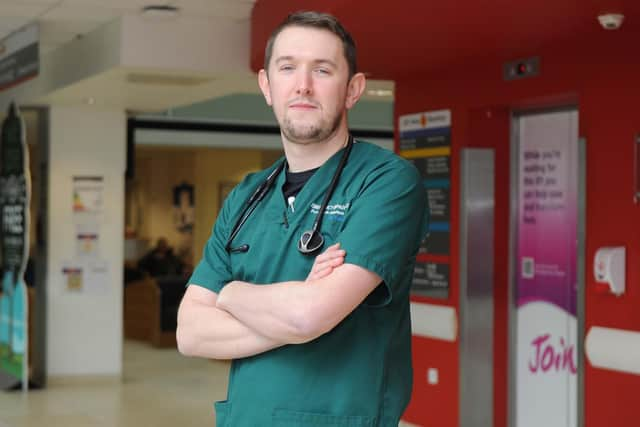Violent patients at Queen Alexandra Hospital in Portsmouth warned: We won’t treat you


Bosses charged with keeping staff safe at Queen Alexandra Hospital have launched a new campaign aimed at reducing violence and aggression - warning that in extreme cases patients could be removed from the site.
Around 15 per cent of staff at the Cosham hospital site were assaulted or abused in the last year according to a survey - the equivalent of 604 people. This is higher than the 14.3 per cent national average.
Advertisement
Hide AdAdvertisement
Hide AdNicole Cornelius, director of workforce and organisational development at Portsmouth NHS Hospitals Trust, said: ‘In extreme cases we can withdraw treatment from this site and they would be required to go elsewhere.’


Ms Cornelius, who was previously a chief officer at Hampshire Constabulary working on reducing assaults on police, added: ‘People leave their jobs as a result of being assaulted because it hits their confidence - it impacts on their families when they go home, it impacts on colleagues and patients as well, it’s not just the individual.
‘That drip, drip, drip effect of having assaults, being abused, it can be really debilitating. I don’t think we should underestimate that and the long-term impact of abuse.’
The stark warning comes after an A&E doctor was punched in the face by an irate drunk patient who was furious about having to wait. Dr David Connor continued to treat the violent the 44-year-old Locks Heath man but said: ‘It’s truly unacceptable.’
Advertisement
Hide AdAdvertisement
Hide AdAs part of a three-pronged approach, a protocol is now in place with police, who will respond to assaults on staff when they are reported and are available, Ms Cornelius said. Staff have also been asked for their views, and a seven-point plan to tackle abuse has been drawn up.


Major efforts are under way to bolster staff confidence in reporting assaults and abuse - with Ms Cornelius insisting current figures, based on a survey, do not show the true extent of the problem.
Two terminals have been installed in A&E so staff can immediately log an incident in seconds - with the units asking if the abuse was physical or verbal, and the possible causes. These include: alcohol, drugs, waiting times, lack of information given, mental health, anxiety and other conditions. Another eight units will be installed at the hospital.
Soon these will link to digital displays in waiting areas, showing people how many times staff have faced abuse that day.
Advertisement
Hide AdAdvertisement
Hide AdMs Cornelius warned ‘robust action’ would be taken against patients and visitors - but accepts incidents can happen due to poor mental health and dementia. In those cases medics will work as best they can around inappropriate behaviour.
Aggressive patients - including one at an outpatients appointment who sat and glowered at a receptionist as he was unhappy about arrangements for patient transport - have recently been sent warning letters.
In both cases patients apologised at their next appointment. In another case, a patient caused damage to a room and assaulted three members of staff – with NHS workers still caring for him.
If initial measures fail or need to be stepped up, the hospital can ask people to sign a behaviour contract - driving home how they should be while on site.
Advertisement
Hide AdAdvertisement
Hide AdSecurity with body-worn video cameras already protect staff and have been praised for their actions by assaulted staff.
Ms Cornelius added: ‘The vast majority of people come here and want to be treated and completely respect the staff that treat them, but the ones that don’t, we want to start the conversation.’
Former murder detective Paul Travers, the security management specialist at QA Hospital, said: ‘I have an admiration for what some of our NHS staff will put up with. A lot of the time we hear it’s all part of the job - I don’t think it should be.
‘Someone coming into hospital needs care but then to lash out violently, maybe unprovoked or what appears to be unprovoked, is very difficult to manage.
Advertisement
Hide AdAdvertisement
Hide Ad‘Having them removed from site is the last thing we want to do if someone is bleeding and needed attention. It’s a difficult balancing act when you know people do need attention.’
A seven-point plan has been drawn up to ensure incidents are dealt with properly.
This includes offering victims support, reporting assaults to police, reducing the possibility of assaults happening again and recording incidents properly.
The hospital will be highlighting the issue on Twitter with #respectandprotect.